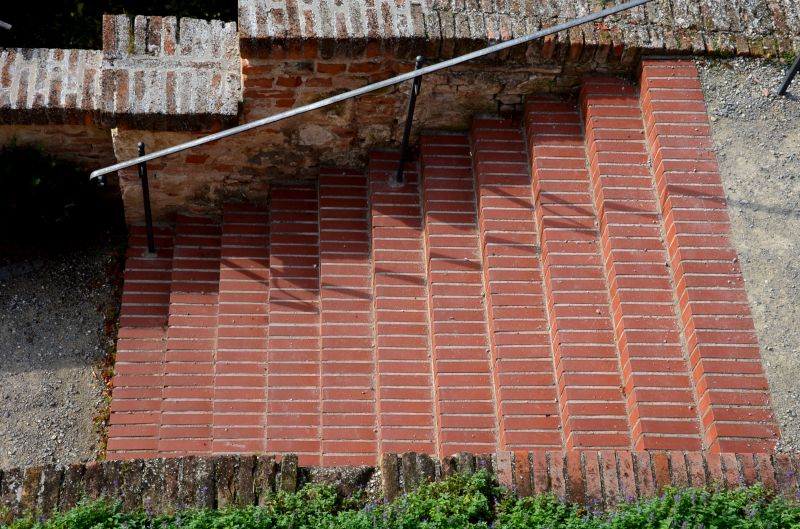Top-Rated Products For Brick Steps Repair and Reinforcement
Browse high-quality repair materials designed to fix cracks, stabilize foundations, and improve the appearance of brick stairs.
 Brick steps are a common feature in many outdoor and entryway designs, offering durability and aesthetic appeal. Over time, exposure to weather elements, foot traffic, and natural settling can lead to cracks, chips, or uneven surfaces that compromise both safety and appearance. Repairing brick steps requires selecting the appropriate products to restore stability, prevent further deterioration, and maintain visual integrity. Proper repair techniques and quality materials can extend the lifespan of brick stairs and improve safety for users.
Brick steps are a common feature in many outdoor and entryway designs, offering durability and aesthetic appeal. Over time, exposure to weather elements, foot traffic, and natural settling can lead to cracks, chips, or uneven surfaces that compromise both safety and appearance. Repairing brick steps requires selecting the appropriate products to restore stability, prevent further deterioration, and maintain visual integrity. Proper repair techniques and quality materials can extend the lifespan of brick stairs and improve safety for users.
Top Overall Option
All-Purpose Masonry Repair Compound
An adaptable and versatile repair compound suitable for filling cracks, bonding loose bricks, and sealing surfaces. It offers good adhesion, weather resistance, and ease of application, making it a reliable choice for various brick step repairs.
Types of Products For Brick Steps Repairs
Masonry Crack Filler
Designed to fill small cracks and chips in brick surfaces, helping to prevent water infiltration and further damage.
Hydraulic Cement
Specialized cement that expands as it cures, ideal for stopping leaks and repairing damaged mortar joints.
Mortar Mix for Repointing
A ready-mix mortar formulated for restoring or replacing mortar joints between bricks, ensuring compatibility and durability.
Brick Replacement Blocks
Pre-formed bricks or blocks used to replace severely damaged or missing bricks in steps.
Waterproof Sealant
Sealants designed to create a waterproof barrier on brick surfaces, reducing moisture penetration.
Epoxy Brick Repair Kit
A kit containing epoxy resins and applicators for bonding broken bricks and filling large cracks.
Concrete Patch
Suitable for repairing damaged or crumbling concrete areas around brick steps.
Mortar Colorant
Color additives to match repaired mortar joints with existing brickwork for a seamless look.
Brick Cleaning Solution
Products formulated to clean and prepare brick surfaces before repairs or sealing.
Repointing Trowel
A specialized tool for applying and smoothing mortar during repointing projects.
Flexible Masonry Sealant
A flexible sealant that accommodates slight movements in brick structures without cracking.
Polyurethane Foam Sealant
Expanding foam used to fill larger gaps or voids in brick steps for insulation and stability.
Rust Remover for Metal Components
Removes rust from metal reinforcements or fixtures near brick steps to prevent further corrosion.
Mortar Repair Caulk
A flexible caulk designed for sealing and repairing mortar joints with ease.
Expansion Joint Material
Materials used to create expansion joints that allow for movement and prevent cracking.
Bonding Agent for Masonry
An additive that enhances adhesion between old and new masonry materials during repairs.
Popular Choices
Widely used for quick filling of small cracks and chips, helping to improve appearance and prevent water damage.
Commonly chosen for stopping leaks and repairing damaged mortar joints in brick steps.
Popular for restoring mortar joints, ensuring a consistent look and structural integrity.
Frequently used to protect brick surfaces from moisture ingress and prolong repair longevity.
Favored for bonding broken bricks and filling large cracks securely.
Chosen for replacing severely damaged or missing bricks, restoring structural stability.
Popular for matching new mortar with existing brickwork for a seamless repair.
Often used to repair damaged concrete areas around brick steps for a uniform appearance.
A common tool for applying and smoothing mortar during repairs.
Popular for sealing joints that may experience slight movements over time.
When considering repairs, it is essential to evaluate the extent of damage. Minor cracks and chips might only require filler or patching compounds, while more significant issues such as crumbling mortar or shifting bricks may necessitate more comprehensive solutions like repointing or replacing individual bricks. The choice of products should match the specific repair needs, ensuring compatibility with existing materials and environmental conditions.
Using the right repair products can also help prevent future issues. Sealants and waterproofing agents can protect bricks from moisture ingress, which is a common cause of deterioration. Mortar mixes designed for brick repair often include additives that improve adhesion and flexibility, accommodating slight movements without cracking. For structural repairs, epoxy-based fillers can bond broken or loose bricks securely, restoring stability.
Investing in quality repair products and understanding their proper application can make a significant difference in the longevity and safety of brick steps. Whether tackling small cosmetic fixes or more extensive structural repairs, selecting suitable materials and following recommended procedures will contribute to a durable and visually appealing result.
Key Buying Considerations
- Assess the extent of damage to determine whether minor filling or major repairs are needed.
- Choose products compatible with existing brick and mortar materials to ensure proper bonding.
- Consider weather resistance and durability features, especially for outdoor applications.
- Select flexible repair solutions if the brick structure is prone to movement or settling.
- Evaluate the ease of application, including whether tools and additional preparation are required.
- Match the color and texture of repair materials with existing brickwork for aesthetic consistency.
- Determine if waterproofing or sealing is necessary to prevent future moisture-related issues.
- Check for appropriate cure times and drying conditions to plan repair schedules effectively.
- Opt for products that accommodate structural stability and safety, especially on stairs.
- Review product labels for suitability in high-traffic or load-bearing areas.
